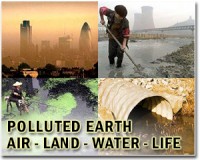 |
Kingston, Canada (SPX) Apr 07, 2011 Queen's researchers have discovered that nanoparticles, which are now present in everything from socks to salad dressing and suntan lotion, may have irreparably damaging effects on soil systems and the environment. "Millions of tonnes of nanoparticles are now manufactured every year, including silver nanoparticles which are popular as antibacterial agents," says Virginia Walker, a professor in the Department of Biology. "We started to wonder what the impact of all these nanoparticles might be on the environment, particularly on soil." The team acquired a sample of soil from the Arctic as part of their involvement in the International Polar Year initiative. The soil was sourced from a remote Arctic site as they felt that this soil stood the greatest chance of being uncontaminated by any nanoparticles. "We hadn't thought we would see much of an impact, but instead our results indicate that silver nanoparticles can be classified as highly toxic to microbial communities. This is particularly concerning when you consider the vulnerability of the arctic ecosystem." Dr. Walker further noted that although technological progress is important, the world has a history of welcoming innovations prior to reflecting on their impact on the environment. Such examples include the discovery of the insecticide DDT, the use of the drug thalidomide during pregnancy and the widespread use of synthetic fertilizers. The researchers first examined the indigenous microbe communities living in the uncontaminated soil samples before adding three different kinds of nanoparticles, including silver. The soil samples were then left for six months to see how the addition of the nanoparticles affected the microbe communities. What the researchers found was both remarkable and concerning. The original analysis of the uncontaminated soil had identified a beneficial microbe that helps fix nitrogen to plants. As plants are unable to fix nitrogen themselves and nitrogen fixation is essential for plant nutrition, the presence of these particular microbes in soil is vital for plant growth. The analysis of the soil sample six months after the addition of the silver nanoparticles showed negligible quantities of the important nitrogen-fixing species remaining and laboratory experiments showed that they were more than a million times susceptible to silver nanoparticles than other species. These pioneering findings by Queen's researchers Niraj Kumar and Virginia Walker and Dowling College's Vishal Shah have been published in the Journal of Hazardous Materials, the highest ranking journal in Civil Engineering.
Share This Article With Planet Earth
Related Links Queen's University Our Polluted World and Cleaning It Up
 Wildlife still largely absent from red sludge area: WWF
Wildlife still largely absent from red sludge area: WWFBudapest (AFP) April 6, 2011 Wildlife has still not returned to the area in western Hungary that was devastated by the country's worst chemical accident six months ago, the World Wildlife Fund said Wednesday. "Wildlife and fishlife were totally devastated or displaced from the area, and six months later, the banks of rivers Marcal and Torna are still red," WWF said in a statement. Ten people were killed last October ... read more |
|
| The content herein, unless otherwise known to be public domain, are Copyright 1995-2010 - SpaceDaily. AFP and UPI Wire Stories are copyright Agence France-Presse and United Press International. ESA Portal Reports are copyright European Space Agency. All NASA sourced material is public domain. Additional copyrights may apply in whole or part to other bona fide parties. Advertising does not imply endorsement,agreement or approval of any opinions, statements or information provided by SpaceDaily on any Web page published or hosted by SpaceDaily. Privacy Statement |